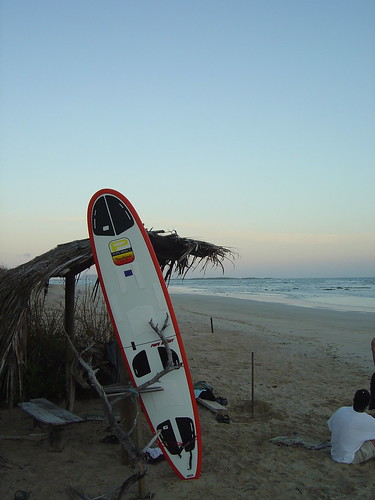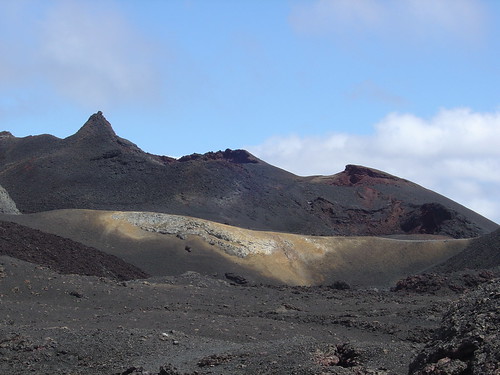 I guess this has been the year of speaking Spanish for me.... I have been to Ecuador 3 times and going for 4th one... quite bizarre... I have not worked in Spanish before and here I’m restructuring the way a country gives their “official guarantees” regarding their fisheries.
I guess this has been the year of speaking Spanish for me.... I have been to Ecuador 3 times and going for 4th one... quite bizarre... I have not worked in Spanish before and here I’m restructuring the way a country gives their “official guarantees” regarding their fisheries.The last trips weren’t much fun... the 1st month (May) was writing a huge document in an office... and the 2nd month there (July) I was explaining it and getting consensus on implementation.
Quite challenging and boring actually, at least during July I had the chance to get around factories and boats... but the highlight was a trip to Galapagos.
As you most know, I’m a biologist, and if I wasn’t doing fisheries, I’ll be doing Evolution, Socio-biology and Theoretical Biology... So far I have not seen any biological or cultural system/organism that at its basics do not behaves under the postulates I learn trough biology and which evolution isn’t condition by neo-Darwinism and associated ideas...
This blog is not to discuss the merits of evolutionary biology, (read Dawkins, Wilson, Maynard Smith, and others) but about the place where Mr Darwin, based on its reading of Maltus, Smith, Wallace and so on, kind of condensed those ideas with the realities he witnessed in this very particular place... the Galapagos...
I believe that the sense of remoteness is exacerbated by the topography and biogeography of the place... I been to more remote places (Minerva Reef, or Palmerston and Suvarov in the Cooks)... but they kind of look like other places... but I never seen anything that look like the Galapagos...
Very young and very old at the same time, tropical jungle and volcanic driedness separated by 25 km... a bizarre collection of indigenous animals, the most pristine water with the most diverse and abundant marine life... and I guess a whole lot of problems...
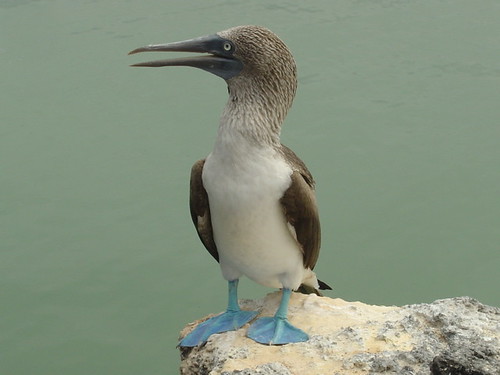
It has his fair share of complexity, is at the same time an National Park, Ecuador’s newest province, home of a similarly bizarre collection of exogenous human inhabitants... from aboriginals from the coast, Spanish sailors to all sorts of outcasts during the pirate and whaling years, to Americans during the war, to Swiss, German, Swedes and Norwegians settlers during the 50’s, Feudal barons in the 1900, Taiwanese tycoons, the openly gay restaurant I have seen in Ecuador, 60’s hippies, ex uber corrupt ministers, ... very weird collection there...
Then the park with a sustainability analysis for handling 40000 tourist a year is actually receiving 120000... and a traditional fisherman culture that is being constricted by the lack of a market exposure, the needs for preservation, the lack of control of foreign fleet, the corruption induced by the rich sport fisherman, and lately the influence of NGOs and “green hero” driven organizations like the SeaSheppard...
So where I start... a fair picture of the wildlife would be that perhaps with the fact that beside surfing the empty white beaches of Isla Isabella, (I took my surfboard with me), with sea lions and manta-rays, I walked out of the water with 1 meter long a marine-vegetarian iguana and a tropical penguin... to later sit on the sand while checking out birds with blue feet, pink flamingos and turtles the size of a quad-bike.
To later get up an almost moon like landscape into the slopes of a volcano that as you get up becomes a dense rain forest (due to cooling of the humid sea air that produces this “belt” of rain), to keep going up into the 2nd biggest crater rim in the world and then into the latest eruption area, a mere 4 years old with no life at all... and then coming back to eat freshly caught goat meat...
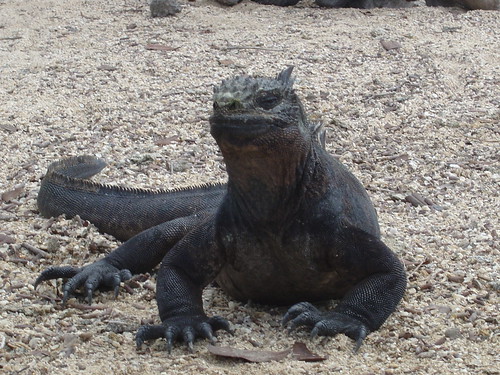
The biodiversity related problems are huge, many of them related to the introduction of foreign fauna; goats (hence the cheap meat), donkeys, rats, dogs and cats becoming feral, and as well as a lot of plants, mostly a guava look alike...
And of course the pressure of people, only 10 years ago the government started with immigration and tough land law enforcement...
On the fisheries side, the problem is quite hard... and so are the actors involved on it... there were basically no rules, but then the “fishing effort” (impact of fisheries measured on # of HP, hooks, nets, people or other units, in one place at one time) was little... population grows... so does the effort... but then... there is the vital issue of: “what do you catch, for whom and how does it get there”...
At 120000 tourist a year + local population, you’ll be feeding around 15000 people a month... so the local market has its demands... but to a point...
Next: when you fish commercially you have roughly 2 options, niche (high value species, low volume, normally fresh fish, live lobster, etc transported by plane) or bulk (low value species, big volume, normally frozen and sent in containers), the common issue is the availability of good logistics and transport. Fast cargo turnaround and the possibility to maintain containers frozen while waiting cargo...
The Galapagos are 3 hours by plane and 3-4 days by sea form the mainland... Energy is produced by diesel generators... and the infrastructure quite minimal... so whoever wants to export has a hard time in terms of knowing that their product is gonna make it to destination in good condition... plus selling fish is competitive and requires a good marketing structure... so the outlook for local fisherman is bleak...
On top of that and most importantly... there is no resource assessment (how much fish is there), no capture limits/control, neither ownership of the resource by either individuals or groups.... so nobody really cares about sustainability, because if I don’t catch it, someone else will... for example: even if there was a ban on the capture of lobster, you still find it in all food joints...
And if that wasn’t bad enough... enter shark-fining and dried “beche-de mer” (sea cucumbers)... dried sharkfins and sea cucumbers can be maintained anywhere for any period of time... they don’t need much infrastructure neither legality... the market (mainly China) does not give a shit from where they come... so that makes them “perfect” for places like the Galapagos and the pacific islands (same happens in Fiji, Tonga, Solomons, PNG and so on).
And the shark fining business is big international money, which does not combine well with poor and corruptible control authorities... hence there are internationally flagged boats and local fisherman catching sharks on theoretically protected waters...
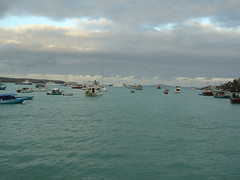
What to do? Million dollar question... there are various ways and none is easy... unfortunately most people try the less successful and useful... prohibition... without going in deep on why prohibiting something does not work... just think drugs and in particular pot... don't we have 70 years of worldwide organized, international, multilateral, multi-religious, multimillions spend efforts...
And still there... if it does not work for pot how we expect it to work for fish... (ironically enough prohibition is mostly push by the NGO and political parties that have pot decriminalization as part of their agenda)... most people with a brain agree that prohibition is the wrong way to deal with drugs... same goes for fish in my opinion.
It should be about education, empowering, involvement, co management and giving the fisherman incentives for preservation instead that only for capture...
Who is the bad guy? the guy that catches the shark or the people that buy the fins? if the Galapagos fisher stops catching fish... what does he do... the chinese buyer would keep buying form somewhere else... you don’t fix a problem by cutting the offer, but by educating and diminishing the demand.
There I was, in the fisherman cove in Puerto Ayoras, just before leaving the islands after a week of intense sun and no shaving, talking to the local of how much participation the had on the management of the resources, what alternatives they are for commercialization of high value species, vertical longlining and size selectivity, when a well known conservacionist from the Sea Shepperd organization (famous for sinking und ramming whale boats) came over with the crew of a French TV chanel to use us as a background for an interview, as their focus has moved from whales to shark finning... and while agree and respect his convictions and good intentions, I disagree with his methods (never really like vigilantes)
Anyhow he rightlhy mention the corruption and lack of resources of the local patrol boats, to the foreing vessels activities... but then slammed the local fisher for the lack of understading and care for their enviroment and so on.... so I was translating all this to the fisherman and their weren’t impressed...
so at some stage I just got up and told them that it was only fair to have the opinions as well of implicated, so they should talk to the fishers and listen their version... while efforts and support should be given to the local control operations... big part of his efforts and media attention should be based in China, on diminishing the demand... but then is obvious that being in Galapagos is nicer and fits better the “green hero” cult... beside his surprised, he did not took very well my intromission.
But then the fishers had a go on the interview... and the issue was clear... if I don’t fish, what I do? I’m a fisher and this is the only thing I know how to do... Turism? I don’t speak languages, neither have the education the employers want... what can I do? why shark fins and “beche de mer”, because is what most money brings... simple capitalism... and if I don’t catch some one else will...
Ergo the solution is not easy... but it has to involve diversification, co-management, access to markets, property rights and constant evaluation on the resource, training,... and all those things that I work on... for me the big problem is not “fishing”, it when people stop talking about “fishing”... at the end we all want the same, just by different ways and that is “to have enough fish” for whatever reason moves us...
I remember always the 1st rule of ecotoxiclogy, that says “the risk is on the dose, not the substance”... or as beautifully put by MC DLT many years ago... “too much of anything makes you a sucker”
